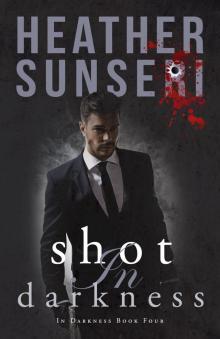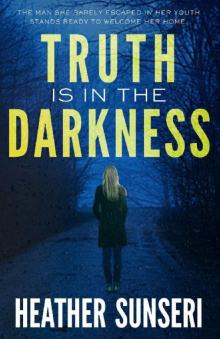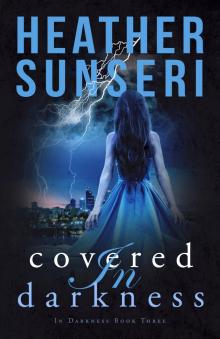- Home
- Heather Sunseri
Covered in Darkness Page 5
Covered in Darkness Read online
Page 5
“We understand,” the governor said. “And my colleagues and I are trying to get to the bottom of what’s going on as quickly as possible. Do you think I can get the four of you to promise not to use violence to get money and food while we sort out the power outage?”
“Of course, Governor.”
The girls smiled. These four were obviously fans of the governor’s. We’d dodged a bullet of sorts.
“You can put your guns away,” the Card said. “We weren’t really going to hurt you. Those guns aren’t even loaded. And we promise we won’t hurt anyone.” He backed up and to the side to let us pass. The others did the same.
“Thank you,” Mac said. He shook each of their hands. “I want you to stay safe and assure everyone you see that we’re working as hard as we can to restore power.”
Officer McElroy and I bent down and gathered their weapons. “We’re going to need to hold on to these,” I said. “Unless you can produce your concealed carry permit.”
“Nah,” the Cardinal said with a wave of a hand. “You go on and keep those.”
That was a little too easy, I thought.
As we continued past them, I glanced back over my shoulder. The group was headed toward the waterfront. I took in a deep breath and let it out with a shake of the head.
I holstered my Glock and wondered what to do with the weapons we’d just collected. “That turned out about as good as we could have hoped.”
A Louisville Metro police cruiser turned a corner and headed our way. I stood in the middle of the alley and held up a hand. He stopped.
“Good morning, miss,” said a uniformed officer as he exited the vehicle.
“Good morning, Officer…” I looked at the badge sewn to his uniform.
“Lively,” he finished for me.
“Officer Lively. I’m Brooke Fairfax, Direct—”
Officer Lively pulled his weapon from his holster and pointed it at me. “Place your weapon on the ground, right now!” He ducked behind his police cruiser.
It didn’t matter how many times I’d had a gun pointed at me, it got my heart racing every single time. I bent slowly down and placed the gun I was holding—the gun I’d confiscated from the Louisville fan—gently on the ground in front of me. Officer McElroy did the same.
I straightened slowly. “I’m Brooke Fairfax, director of Kentucky’s Office of Homeland Security. I’m here with the governor”—I nodded over my shoulder—“and one of his state police detail, Officer McElroy.”
Officer Lively’s gaze shifted from me to the governor. As recognition registered, he still asked, “Can I see some identification?”
“Of course.” I pulled my identification from my pocket, as did the governor and Officer McElroy. I stepped around the cruiser and handed all of our IDs to the policeman.
After examining everyone’s ID, Officer Lively nodded to the state trooper and me, then to the governor. “Good morning, Governor. Sorry, I didn’t recognize you at first.” He handed me the three IDs, holstered his firearm, and skirted his cruiser.
“It’s okay, Officer,” Mac said.
“I don’t mean any disrespect, sir,” the officer said, “but what the hell is going on? Any idea when power will be up? We’ve heard everything from a few hours to twenty-four hours.”
“Officer Lively, that’s what we came to find out. We’re going to try to get a more firm answer on that as soon as possible.”
“Well, I can tell you that the hospitals are already over capacity from last night’s storm, and now from people pouring in who depend on electricity for home medical care. It won’t be long before every assisted living facility in the city floods our hospitals with the elderly.”
“Don’t those facilities have backup generators?” Officer McElroy asked.
Mac shook his head. “Unfortunately, only nursing homes are required by federal and state law to have backup power. Not all assisted living or other homes for the elderly are going to have such expensive measures. And with the high temperatures, the lack of air conditioning is a real health risk for the elderly.”
Officer Lively nodded. “That’s absolutely right. And folks are getting restless not knowing how long their power will be out. We don’t have a lot to tell them.”
Officer Lively was painting a bleak picture, but he was right. Even with the Louisville news stations reporting on the situation, most citizens had no way of watching it. And this wasn’t like a snow or ice storm, where people had time to prepare, to stock up on supplies, to make arrangements for the sick and elderly. This had taken the citizens by surprise. We were unprepared.
“On top of all that, Metro Police is struggling to communicate with fire and ambulance. Too many of us are on different radio systems. We have to rely on dispatch to communicate all details, and our 911 operators are overwhelmed.”
I touched the officer’s arm. He was young, early twenties if I had to guess. “Officer Lively, how is your family?”
“Ma’am?”
“Your family? You have a wife? Children?”
“Yes, ma’am. My wife is home with my three children.”
“How old?”
“Four, two, and one month.”
“Are they safe?” I asked.
“Yes, ma’am. But it’s so hot. I worry about my baby girl.”
“Listen. I need you to do something for me.” I pulled a business card and pen out of my back pocket, and I wrote our radio frequency on it, plus Ty’s name. “Here’s my business card. I need you to go back to the station and give your chief this. I need him to call me either on the radio or on my cell if he can get through. I’m going to try getting all of the police, fire, and ambulance talking. And the governor and I are going to have something to tell your chief and everyone in the city before the middle of the day.”
Mac nodded in agreement. “I’m going to make a statement very soon. At the very least, I’m going to get help in here to offer support to police and the hospitals. We’re going to make sure the hospitals can continue to operate. Okay?”
“Thank you, Governor.”
“Now, we just passed a group of individuals headed toward the waterfront.” Mac pointed at the weapons on the ground. “Officer McElroy and Director Fairfax just took these weapons from them, but I expect they may not be done causing trouble.”
Officer Lively looked down at the weapons. “There’s some looting going on up the street. A mom-and-pop sporting goods store got hit. I wouldn’t be surprised if these weapons were stolen from there.” He scooped up the items and carried them to the passenger side of his cruiser. “Well, unless you want an escort, I’ll let you be on your way. I’ll pass along this information to the chief immediately.”
We were cleared through a team of three security guards in the lobby of Louisville Power, then climbed the stairs to the eleventh floor, where the executive offices were located. Apparently LP had enough generator power for emergency lighting in the stairwell, but the elevators were down, as was the HVAC system. The three of us were out of breath and sweating like we’d run a marathon by the time we reached our destination.
Two men and a woman stood in the reception area on the eleventh floor. Behind them, natural light flowed in from the windows of a conference room.
“Can we help you?” one of the men asked, then paused with a finger pointed at the governor. “Governor Kale.” He walked forward and held out a hand. “Ryan Saltzman.”
Ryan Saltzman was CEO of Louisville Power, but at the moment he was not looking like an executive. His brown hair was disheveled, he wore a polo shirt and jeans, and sweat marked his armpits.
“Good morning, Mr. Saltzman,” Mac said. “Allow me to introduce Brooke Fairfax, director of the Kentucky Office of Homeland Security.”
Mr. Saltzman straightened. “Miss Fairfax.” He shook my hand with a nod.
“And the head of my security detail, Officer McElroy.”
Saltzman shook Officer McElroy’s hand as well. “Well, this is a pleasant surprise,
Governor. I can imagine you’re eager for a status update, and I’ll be happy to get you up to speed. But Homeland Security? Is that necessary?”
I smiled. “Yes, Mr. Saltzman, it is necessary. I’m tasked with making sure that Kentuckians are safe at all times. Whether the people of the commonwealth are threatened by natural disasters, criminals, or terrorists, it’s my job to try to remove or alleviate that threat.”
“Terrorists,” he laughed, but his smile faded when I directed a hard stare at him. “Well, in that case, why don’t we go into the conference room, and I’ll brief you on the situation. And please, call me Ryan.”
As we walked into the adjoining conference room, he introduced the man with him, who had black hair and two-day-old stubble. “This is Frank Gentry, Vice President of Power Production.” Ryan then turned to the woman. “Sam, can you please ask Blake to join us? And find our guests some water.” He smiled at us. “It will be warm, but it’s something.”
I recognized the woman now. Sam. This was Jude’s friend and former fusion center analyst. I’d met her only once before, but I had tried to recruit her when I was building my team. Unfortunately, she didn’t accept the interview.
“Of course,” Sam said. Her tone was pleasant, but her brow furrowed. She made eye contact with me before turning to go find Blake.
Was there a message in her eyes? She looked worried or fearful, like she wanted to say something to me. But I shook it off and entered the conference room.
The blinds were partially closed, probably to keep the room cool. Ryan gestured for us to sit, but I was the only one who did. Officer McElroy stood stoically by the door, while Mac placed his hands, fingers wide, on the conference room table and leaned in. It was a power stance. “So, Ryan and Frank,” he said. “Tell me when we can expect to have power back up. My largest city is quickly growing restless. As am I.”
With a glance at Ryan, Frank walked over to a whiteboard. He walked us through a diagram of where the power plants and compressor stations were located, plus another outlining how the Louisville Power grid operates congruently with other parts of the interstate grid. “Once one part of the grid was knocked out, other areas of the grid tried to make up for the shortcoming, ultimately overloading several areas.”
“Domino effect,” I said.
“Exactly,” Frank answered.
“But I was always under the impression that that wasn’t how our grid worked,” I said.
“What do you mean?”
I wasn’t sure I could speak intelligently about the power grid, but I was about to try. “My understanding, prior to today, was that when part of our power grid goes out, it doesn’t knock out other parts of the grid. Especially when other parts of the grid are owned by completely different private companies.”
“Did you read that on the internet?” Ryan asked, in an extremely condescending tone.
“Actually, I read that in a weekly email briefing I received from the Department of Homeland Security—an article written by DHS’s main infrastructure analyst.”
Ryan stood and faced the governor and me. His face was red, and when he leaned into the table, he did so with formed fists. “What we know,” he said, basically ignoring what I had said, “is that nearly half a million Louisville Power customers are without power.”
“Which is about a million people in Jefferson County, by my office’s estimation,” Mac said.
“Yes.” Ryan wiped his brow with his sleeve.
“So back to the original question,” Mac said. “How long before power is restored?”
I watched the back-and-forth while processing what Ryan was saying and attempting to form the question I wanted to ask.
“We’re already working on black-starting, or rebooting, the system. It could be as little as three or four hours, or it could take a bit longer. But worst-case scenario, no more than twenty-four hours.”
I had just opened my mouth to speak when a woman entered the room. She wore a loose-fitting blouse and a business skirt. She looked professional and as cool as anyone could look in the heat. Her dark auburn hair was pulled into a low bun at the base of her head. “Hello, gentlemen.” She turned to me. “Oh, and lady. Sorry. I’m Blake Saltzman.”
“Governor,” said Ryan, “Miss Fairfax. This is my daughter, and resident spin doctor for Louisville Power. She’s been working on a statement for the press.”
“Spin doctor,” I repeated. I was getting a terrible vibe from the management team. Exactly what were they planning to spin?
“That’s correct,” Ryan said. “Blake is an expert at PR.”
Judging by the way she carried herself—confident, put together—I had no doubt that was true.
Mac straightened and crossed his arms. “Blake is ready to make a statement to the press that says what, exactly?”
Blake smiled. “I plan to inform the people of Louisville and the surrounding communities that Louisville Power is working diligently to get power restored. The grid is in the process of a hard reboot, and should be back in business in less than twenty-four hours.
“But—” I started, before being rudely cut off by Ryan.
“Governor,” Ryan said, “I assure you that Louisville Power is doing everything we can to repair the damage caused by the storm and to restore electricity.”
I pushed my chair back and stood abruptly. “Wait,” I said, holding up a finger. “You keep saying that the substations need to be repaired and that Louisville Power is doing every they can to ‘repair the damage caused by the storm.’” I used air quotes to emphasize my point. “But you also say a hard reboot is already in process. You expect power to be restored in as little as three to four hours—but you also say it’ll take up to twenty-four hours. So which is it, gentlemen?” I looked to Blake. “Sorry… and lady. Is it four hours, or twenty-four hours? Are you restoring power with a reboot, or are you repairing storm damage? And if you’re repairing the substations, can you simultaneously reboot the system?”
Ryan and Frank exchanged a look before Ryan turned his steely eyes on me. “You’re perceptive, Miss Fairfax. The point is, we’re working hard to repair the damage and restore power. And it could take anywhere from four hours to twenty-four hours.”
I stopped short of giving the three of them a condescending, “Uh-huh.” I was in no position to argue the point. I would have to give them the benefit of the doubt for now, but every alarm in my body was going off. I didn’t believe the people in this room.
“You’re confident it’ll be no more than twenty-four hours?” Mac said. “Because I’m about to declare a state of emergency, and if I look at the people of Kentucky and tell them to expect their power back up in the next twenty-four hours, I expect that to be the truth.”
“You can count on it, Governor,” Ryan said. “Now, let me walk the three of you out.”
Ryan and his daughter followed us to the door to the stairwell. When we reached it, I turned back. “One more question, Ryan. Why did you call your head of cyber security into the Louisville Power offices so early this morning?”
If I hadn’t been looking for it, I would have missed the slight look of panic that passed over both Blake’s and Ryan’s features before they recovered.
“And how would you know when I called any of my employees?” Ryan asked.
Before I could respond, Blake placed a hand on her dad’s arm. “Our cyber security and IT teams are essential to getting our system rebooted. Now, Miss Fairfax, we have provided Homeland Security with the information you need. If you’ll excuse us, we have work to do.”
We had been dismissed.
After exchanging our two-way radio and cell phone information, Mac, Officer McElroy, and I made our way down the stairs and out of the Louisville Power building.
“I don’t know what just happened in there,” I said to the governor. “But those people were hiding something.” I remembered what Sam had shared with Jude about her bosses acting strange. I would have to agree with that assessment.
“I felt that as well,” Mac said.
“My advice? Don’t promise the people of Kentucky anything you, personally, aren’t sure will happen. Let LP make the promises while you declare Kentucky in a state of emergency. Get the National Guard in here to help law enforcement and hospitals until electricity is restored. I’ll monitor the situation with Louisville Power.”
Chapter 7
I arrived back at KOHS at lunchtime. I found my analysts, plus Ty, Marti, and Alli, gathered just outside the fusion center conference room with white paper bags.
“Hey,” Marti said, “we got you lunch. Mom brought it.” She held up a white paper bag with my name and a smiley face scribbled on the side of it.
Down the hall, Declan appeared. He stopped just outside my office and raised an eyebrow in my direction.
I took the bag from Marti. “Thank you. I’ll eat in my office. Looks like I have a visitor.”
She smiled. She had color back in her face and didn’t look nearly as hung over as she had earlier.
“You guys eat,” I said to the group. “Let’s meet in thirty minutes. The governor is expected to hold a news conference soon. We’ll discuss what I learned in Louisville afterwards.”
I walked down the hall to Declan. As I got close, I held up the white bag and wiggled it. “Carrie Anne sent lunch. Want to share?”
He slid his hand to the back of my neck, leaned in, and kissed me gently on the lips. “Hi,” he said when he drew back.
“Hi.”
“You have worry in your eyes.”
“Do I?” I slipped my hand into his, pulled him into my office, and closed the door behind us. I set the bag on my desk and reached for the remote control. “The governor is supposed to make a statement. Not sure when.”
I turned on the TV to NBC, where I knew the local station out of Louisville would preempt if the governor went live. Some talk show was on, but a ticker ran across the bottom with business closings due to weather damage. I muted it.

 Mindspeak
Mindspeak Shot in Darkness
Shot in Darkness Truth is in the Darkness (Paynes Creek Thriller Book 2)
Truth is in the Darkness (Paynes Creek Thriller Book 2) Special Forces: Operation Alpha: Protected in Darkness (Kindle Worlds Novella)
Special Forces: Operation Alpha: Protected in Darkness (Kindle Worlds Novella) Desired in Darkness
Desired in Darkness Covered in Darkness
Covered in Darkness Deceived
Deceived Death is in the Details
Death is in the Details Exposed in Darkness
Exposed in Darkness Emerge
Emerge Secret is in the Bones (Paynes Creek Thriller Book 3)
Secret is in the Bones (Paynes Creek Thriller Book 3) Mindsiege
Mindsiege Mindsurge (Mindspeak Book 3)
Mindsurge (Mindspeak Book 3)